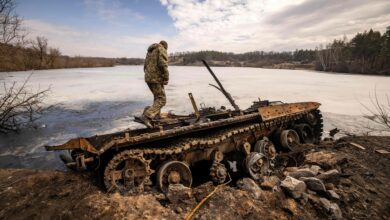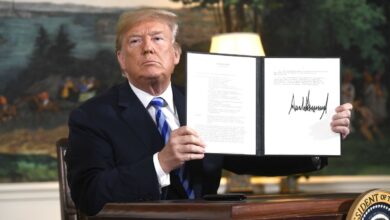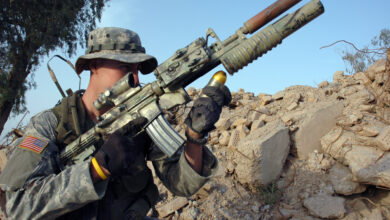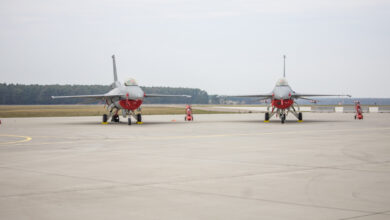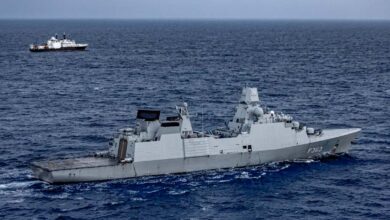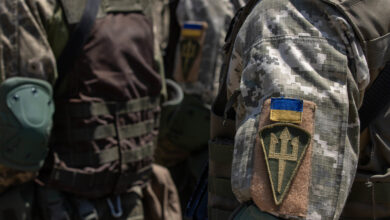
As Ukraine’s counteroffensive is starting to roll, this war has many surreal facets.
For example, the US is once again doing most of the heavy lifting to defend basic human rights in Europe. Leading EU nations refused to put troops into eastern Ukraine in January 2022 when this could have prevented a war that has already killed and injured more than 350,000 people, devastated Ukrainian cities, and caused enough economic havoc to shave a full 2 percent off of global GDP growth.
Former German Chancellor Angela Merkel persisted in trying to appease Vladimir Putin for another seven years after he annexed Crimea in 2014. And well into the war, some “neorealists” were still trying to argue that Russia’s intervention was somehow NATO’s “fault” for honoring the strong desire of former Soviet states in eastern Europe to be protected.
Abuse of ‘Escalation’
These shocking realities are now so familiar that they have receded into the background as NATO nations debate their short-term policies. But within these discussions, abuse of the term “escalation” has also acquired a surreal quality.
Due to fears of “escalation,” NATO allies were sluggish in providing heavy weaponry, waiting over a year into the conflict to supply tanks, short-range missiles with a limited range of 50 miles (80 kilometers), and improved air defense systems.
Yet, every time Ukraine receives additional military support, Moscow accuses NATO of “escalating” the conflict — a baseless objection echoed by some Western leaders.
In January 2023, despite Russia’s constant targeting of civilian structures, German Chancellor Olaf Scholz opposed sending fighter jets because that would only “escalate” the conflict.
And President Joe Biden, Kyiv’s staunchest supporter, has repeatedly said that using US-made military hardware to attack targets within Russia is unacceptable because it would constitute “escalation.”
Likewise, National Security Advisor Jake Sullivan has opposed sending long-range missiles because they could reach Russian territory and thereby spark a world war.

What Is Escalation?
The term “escalation,” frequently invoked without precise definition, warrants closer examination. In a factual or political context, “escalation” refers to the expansion of the war theater or the adoption of more destructive weapons.
It also covers the progression from jus ad vim methods short of full-on war (such as containment, naval blockades, economic sanctions, and cyberattacks) to airstrikes, naval confrontations, and ground invasions.
Unquestionably, once escalation triggers are activated, maintaining control becomes challenging as thresholds are crossed, leading to shifts in group allegiances and perceived stakes.
Norms
But a clear aggressor (Russia) that illegally attacks and invades a sovereign nation is primarily responsible for any “escalation” necessary to counter their attacks and make a just peace.
When the accusation of “escalation” is made, it pertains to the concept’s normative aspect, which relates to the principles of jus in bello governing the methods of warfare. These principles are codified in treaties like the Geneva Conventions and customary laws of war.
Among these concepts is the principle of proportionality, which dictates that those defending a victimized nation should employ only the necessary amount of force to defeat the aggressor and establish a just peace (while also not using any intrinsically horrendous means, such as chemical weapons).
Engaging in excessive damage beyond what is required for legitimate aims, such as liberating annexed or occupied territories, would constitute unjust escalation. Similarly, pursuing vastly ambitious war goals disproportionate to the initial wrongs would also be unjust escalation.
To call defensive acts meeting this standard “disproportionate” because the aggressor may respond in harmful ways would allow any tyrant to brand all defense immoral by threatening some enormity if there is any opposition to their aggression.

Legitimate Means
Crucially, nothing in these norms restricts a victimized nation to only counterattack within its own territory.
In fact, the overwhelming consensus is quite the opposite. In the face of attacks originating from missile launch sites, artillery depots, and airfields within Russia, targeting these areas becomes a completely legitimate form of defense, as it is essential for defeating the aggressor.
This justification becomes even more evident when Russia is deliberately targeting civilian infrastructure, committing continuous war crimes.
By analogy, imagine a mother whose neighbor is shooting at her children’s bedroom window from within his yard. With police far away, you bring a gun to help her. But you tell her that (a) you won’t use the gun yourself and (b) she should refrain from using it against the neighbor unless he crosses into her yard, as it may provoke him to target your house as well. That would be a strange mix of cowardice and backward strategic thinking.
Yet that is precisely the surreal position that NATO nations have put Ukraine in. By setting this limit of not targeting anything within Russia, the US, Germany, and other allies are telling Ukraine that it would be wrong to neutralize missile launch pads just east of Ukraine’s border or to target Russian missile ships in the Black Sea.
Skewed Narrative
Characterizing Ukrainian strikes on military targets within Russia as “escalation” in the normative sense provides Putin with an ideological weapon. It enables him to portray such actions as grave offenses, granting Russia a seemingly legitimate grievance.
The demand for Ukraine to fight with one hand tied behind its back also confuses journalists, whose narratives imply that if Kyiv takes the fight into Russia, Ukrainian leaders would somehow be guilty of endangering Europe and provoking Putin to widen the war or maybe even use nuclear weapons.
Obviously, this gives Putin a huge mental advantage. In fact, fear that he will exploit casualties and damage within Russia to expand the war to other nations is misplaced: his forces can barely manage Ukraine, and he has largely maxed out the Kremlin’s propaganda capacities.
But Western anti-escalation rhetoric tells Putin that such threats work, encouraging him to take actions that reinforce such Western fears. For example, he last week confirmed Russia had sent nuclear arms to Belarus.
Ironically, the fear of escalation among Ukraine’s allies has invited escalation on Russia’s side.

Furthermore, the conflation of defense with improper escalation implies that Western allies would only be at war with Russia if the donated arms are deployed against targets within Russia, but not otherwise.
This standard lacks any basis in the laws of war. Traditionally, when A directly assists B’s war effort against C, A becomes a belligerent on the side of B. Putin already believes that a de facto state of war exists between NATO and Russia, despite the self-stymieing way Western leaders are trying to deny this to their citizens.
Let’s Stop Cowering
It is time to scrap this unnecessary and counterproductive “escalation” red herring. After all the horrors Russian forces have heaped upon Ukrainians, why grant Putin a narrative advantage and confuse Western audiences about the justifications for “legitimate defense”?
Ukraine’s allies should clearly state that if Ukraine starts hitting more military targets inside Russia, and Putin does respond with even more destructive attacks or widens the war to other nations, it will be Russia, not Ukraine, that is guilty of “escalation.”
In such a scenario, NATO should respond by directly deploying forces against Russian targets. Let’s stop cowering and start deterring.
Bombing schools and hospitals across Ukraine was already escalation. Kidnapping thousands of Ukrainian children to be “adopted” and brainwashed by Russian families was escalation by ethnic cleansing. Filling the mercenary Wagner Group with Russia’s worst criminals and sending them to rape, pillage, and kill without discrimination was escalation. Flooding a million hectares of towns and vital farmland by exploding a vital dam is yet more escalation.
In contrast, targeting Russian missile launch sites, air force facilities, and naval vessels that have been responsible for mass murder in Ukraine would not be “escalation” in the normative sense. It would be an act of justice.
 John Davenport is Professor of Philosophy and Peace & Justice Studies at Fordham University.
John Davenport is Professor of Philosophy and Peace & Justice Studies at Fordham University.
He is the author of The Democracy Amendments, available through Amazon.com.
The views and opinions expressed here are those of the author and do not necessarily reflect the editorial position of The Defense Post.
The Defense Post aims to publish a wide range of high-quality opinion and analysis from a diverse array of people – do you want to send us yours? Click here to submit an op-ed.


